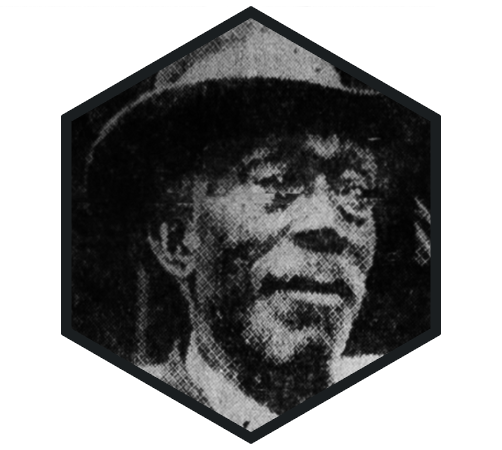HISTORY
NOTABLE INTERMENTS

Dred Wimberly was born enslaved in 1848 on the Walnut Creek Plantation near Tarboro, North Carolina. The plantation was owned by James Smith Battle (1786-1854), prominent planter, politician, and judge in Edgecombe and Nash counties. Dred was one of 10 children of Allen and Della Battle Wimberly. His siblings included Mariah Wimberly McNair, Isabella Wimberly McNair, Joseph Henry, Lucy Wimberly Horne, Frank, Richard, Louisa, Annie Etta, and Robert. After James S. Battle’s death, Dred was gifted to Mary Ann Battle, daughter of James S. Battle, who married Dr. Kemp Plummer Battle in 1855.
After the Civil War, Wimberly remained on the Battle estate, in charge of the transportation of goods and supplies from Walnut Creek and Flag Marsh farms to Kemp Plummer Battle’s primary residence in Raleigh.
“I was the man entrusted with the job of delivering the products to Dr. Battle. It took me two days to make the trip on horse and wagon. I camped at night on Moccasin Creek, half the distance between Rocky Mount and Raleigh.”
By 1870, Dred moved off the Battle estate, and took up farming for himself and his young family. He married Kizziah Whitfield shortly after the war, and to their union were born five children: Mary Ann, Andrew, James, Arthur Brooks, and Frank, his youngest likely named after Dred’s brother Frank Wimberly (ca. 1857-1879).
It was during this period that Dred Wimberly became active in politics. Affiliated with the Republican party, Dred served three terms in the North Carolina General Assembly, as a member of the House of Representatives in 1879 and 1888, and member of the state senate in 1889. “I got into it when I wasn’t looking,” he later recalled. “I was asked to run for the House, I hesitated at first and I asked them to look around a lot more. They nominated me anyhow, and I was elected.” While in the legislature, Dred supported key legislation, voting in 1879 in support of improvements to roadways and other infrastructure, and in 1887, for the bill to establish North Carolina State University, Raleigh.
After he retired from the legislature, Dred remained active in Republican party politics in North Carolina, and served as a state delegate to the 1900 Republican Convention in Philadelphia. Later, Dred worked as a janitor in the House of Representatives in Washington, D. C., for two years, before he returned to Rocky Mount in 1903.
In 1910, Dred and family were documented on Tarboro Road in Rocky Mount, with Dred noted as a carpenter. He married Ella Bertha Jenkins (1867-1945), daughter of Benjamin and Gracie Jenkins, in 1891, and six children were born to their union, including sons Luther (1893-1915), John Jameston (1900-1961), and Allen Benjamin (1905-1968), and daughters Della (1896-1914), Annie (Bell) Wimberly Battle (1903-1962), and Lucy Mae (1909-1927). In subsequent years, Dred worked alternately in carpentry, and as a grocer, spending many days recounting his activities and experiences in Reconstruction-era politics to neighbors and friends alike.
Dred Wimberly passed away on June 16, 1937, and was interred in Unity Cemetery, where he rests with his wife Ella Bertha Jenkins Wimberly, his children Lucy Mae, Della, and Luther Wimberly, and other family members.
